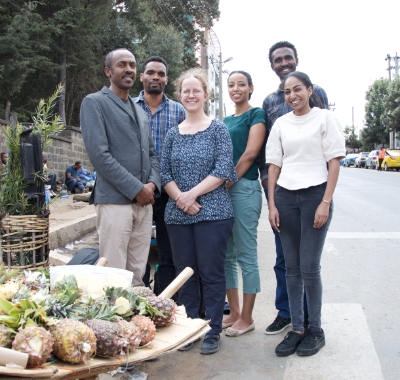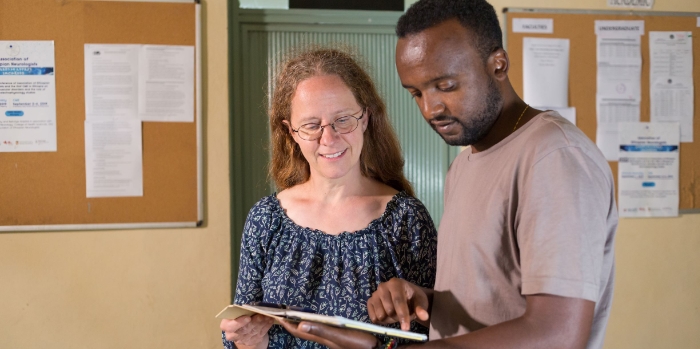A hospital partnership is at the forefront of efforts to improve cervical cancer screening and treatment
Cervical cancer is easily preventable, but a lack of screening means that many women in Ethiopia are diagnosed late – and then face long waiting times to see a cancer specialist. With support from the Hospital Partnerships programme, multidisciplinary teams from the Martin-Luther-University Halle-Wittenberg and Addis Ababa University have been tackling these challenges together.
When Dr Dawit Worku was doing his residency in obstetrics and gynaecology at the Tikur Anbessa Specialized Hospital, the main teaching hospital of Addis Ababa University, he was struck by the number of women with advanced cervical, uterine and ovarian cancers who were referred to the hospital from all corners of Ethiopia. ‘There were about five gynaecologic oncologists in the country at that time,’ he recalls. ‘As a result, the waiting times for patients with reproductive organ cancers were unacceptably long.’ Many women with potentially curable tumors did not receive treatment on time. By the end of his residency, Dr Dawit had decided to continue his studies and to sub-specialise in gynaecologic oncology.
The burden of cancer is rising in Ethiopia, and two-thirds of all cancer deaths occur among women. Specialists like Dr Dawit are part of a growing community of clinicians and public health experts linked to Addis Ababa University who are committed to making screening, early diagnosis and treatment of cancers more accessible to women across Ethiopia. Working alongside them – sometimes at a distance, and sometimes face to face – is a multidisciplinary team of experts from the Martin-Luther-University Halle-Wittenberg in Germany. For more than a decade now the two universities have been collaborating through a peer-to-peer partnership which is supported, among others, by the German Ministry for Economic Cooperation and Development (BMZ) and the Else-Kröner-Fresenius Foundation through the Hospital Partnerships – Partners Strengthen Health programme. This programme is implemented by Deutsche Gesellschaft für Internationale Zusammenarbeit (GIZ) GmbH.
How it all started

The driving force behind the hospital partnership on the German side is Dr Eva Kantelhardt, a clinical gynaecologist and epidemiologist who first travelled to Ethiopia more than 20 years ago, as a medical student. While completing electives in Ethiopia, she established contacts with a number of colleagues interested in women’s health. Later, through the German Society for Gynaecology and Obstetrics, she began partnering with them on some projects related to obstetrics.
Dr Kantelhardt began paying more attention to female cancers in 2008, after an Ethiopian friend was diagnosed with breast cancer: ‘At first I thought that her case must be rare, but as I began speaking with oncologists, I realised it’s a much bigger problem,’ she explains. ‘There are more than 100 million people in Ethiopia, and barely any specialists in female cancers.’ At that time, non-communicable diseases (NCDs) and cancer were not high on the agenda internationally or within Ethiopia.

By 2009 a formal university partnership, which included a focus on gynaecologic oncology, was in place between the two institutions. A fact-finding mission supported by the German Academic Exchange Service (DAAD) identified some areas for collaboration, and Dr Kantelhardt and Dr Adamu Addissie, at the School of Public Health, began discussing and planning initial activities. The core group rapidly grew to include clinical oncologists, pathologists, biomedical specialists, and public health experts from both institutions, as well as German medical students and Ethiopian PhD students. In hospital corridors and university classrooms in both Halle and Addis Ababa, guests from the partner institution became a regular sight.
The partnership grows, with German government support
One of the early milestones, made possible by support from Germany’s Federal Ministry of Education and Research in 2011, was the establishment of the first population-based cancer registry in Ethiopia, covering all the inhabitants of Addis Ababa. In 2014 the partnership took another step forward with support from BMZ through ESTHER Germany (today the University and Hospital Partnerships in Africa programme) – an institutional twinning programme also implemented by GIZ. Then, in 2017, the Hospital Partnerships programme provided the first of two rounds of support – one focused on clinical training for gynaecologic oncologists, and the other on strengthening screening and diagnostics. With each new layer of project funding, the partnership has grown more far-reaching and comprehensive in its approach.
‘The Halle-Addis Ababa partnership feels a bit like a tree,’ observes Carolin Okrent, an advisor with the Hospital Partnerships programme which is implemented by GIZ. ‘It started out with a certain focus, but new dimensions keep emerging. What is really unique about it is that so many people are involved on both sides. This is not a partnership with a narrow medical focus: it’s become deeply connected to networks on cancer and NCDs in Ethiopia.’
In this respect, it embodies one of the main aims of the Hospital Partnerships programme, which is to encourage linkages between clinical experts and the development community. The GIZ team in Bonn which implements the programme does this by organising regional and thematic networking meetings, holding induction workshops for new partnerships, and providing individualised advisory services. The Hospital Partnerships programme comprises 182 partnerships in 51 countries.
Training and mentoring to perform complex surgeries
The first round of support from the Hospital Partnerships programme focused on upgrading surgical skills among gynaecologic oncologists. Ethiopia’s Ministry of Health has put in place a cervical cancer screening programme which is likely to increase the number of operable cases of cervical cancer referred to hospitals. As a result, specialists in Ethiopia need to be able to carry out long and complicated surgeries, such as Wertheim’s operations, which are now relatively rare in countries with well-established screening programmes. Since 2017, fifteen Ethiopian specialists have travelled to the University Hospital Halle and other collaborating institutions in Germany to see how such surgeries are conducted and to receive hands-on training.

‘The chance to have a clinical attachment and an additional mentor in Halle has had a big impact on my training,’ Dr Dawit Worku explains. Not only has he learned specific surgical skills – such as debulking surgeries for ovarian cancer and hysterectomies of different degrees of radicality – but he has also been exposed to a multidisciplinary approach to decision-making in cancer care (e.g. tumor boards). ‘The experiences in Halle have improved my thought processes about optimal care for women with reproductive organ cancer.’
According to Dr Kantelhardt, individual mentoring and close supervision are essential for a thorough training. The chance for Ethiopian colleagues to spend several weeks at a time in Halle allows them not only to improve specific skills, but also to understand how a cancer center operates. ‘Beyond learning surgical skills, the visiting colleagues have the chance to see good quality diagnostics and to observe how multiple experts – pathologists, radiologists and gynaecologists – come together at key points to discuss cases and make recommendations.’
Creating a national reference laboratory for HPV testing

The second project supported through the Hospital Partnerships programme focuses on strengthening laboratory capacity to screen for the human papillomavirus (HPV), which can cause cervical cancer. The World Health Organization recommends HPV testing as the primary method of screening for cervical cancer due to the high specificity of the tests. HPV testing is not yet well-established in Ethiopia; visual inspection of the cervix with acetic acid (VIA) is more commonly employed. However, with the eventual transition to HPV testing in mind, the teams from Halle and Addis Ababa are working to establish the first national reference laboratory for HPV testing at Tikur Anbessa Specialized Hospital. With support from the Hospital Partnerships programme, the colleagues in Halle and Addis Ababa are procuring equipment, such as PCR machines, training laboratory personnel, and working together to identify an inexpensive and reliable HPV test which returns precise results.
Building on this, with support from the BMZ-funded University and Hospital Partnerships in Africa programme, the teams in Halle and Addis Ababa are helping to digitalise the laboratory and to upgrade systems for identifying, tracing and reporting on HPV samples which are sent from health facilities. A web-based solution is being developed which will allow health workers to track the status of samples they have submitted for testing, and to be notified electronically when results are ready. Improving the communication between outlying facilities and the central laboratory will help to overcome delays and ‘lost’ results which undermine timely referrals for women diagnosed with pre-cancerous or cancerous lesions.
Better screening, diagnostics and treatment are saving women’s lives
‘The hospital partnership with Halle is one of the flagship projects for our school, and has helped to change the actual practice of screening and care for cervical cancer patients in our country,’ says Mr Muluken Gizaw, an Assistant Professor of Public Health at Addis Ababa University and the focal point for partnership activities in Ethiopia.

One of the clearest examples can be seen in Butajira, a town in south-central Ethiopia where Addis Ababa University supports a large-scale cervical cancer screening programme. More than 4000 women from Butajira have been screened, and those who required follow-up have been referred to the gynaecologic oncologists at Tikur Anbessa for further investigation or advanced surgical interventions. HPV samples from the screening programme are also sent to the hospital lab for processing. ‘I highly value the work the partnership has done in Butajira,’ says Muluken Gizaw. ‘Death has been turned into life for many women.’
Big plans for the coming decade

As a result of the comprehensive activities it has supported in a previously neglected area, the hospital partnership between Addis Ababa and Halle is squarely at the forefront of efforts to improve cervical cancer care in Ethiopia. The colleagues at Addis Ababa University coordinate closely with staff at the Ministry of Health who are responsible for NCDs and cancer, which means that lessons generated by partnership activities are helping to inform national strategies. New priorities and gaps are continually being identified and there are big plans in the works, including the establishment of a cancer center, funded by the Else-Kröner-Fresenius Foundation, which will provide cutting-edge care to women with reproductive organ cancers and eventually to patients with other types of cancer, such as prostate and colon cancer. The center will also serve as a training facility for staff from six newly established regional cancer centers.
‘I am hopeful that cancer care will become more of a focus in the future,’ says Dr Eva Kantelhardt. ‘I’ve seen it in my own friend’s fate: it is so difficult for cancer patients! The public health system is strained, but there are still many things that can be done now. Diabetes and hypertension care are already being decentralised. So we’re asking ourselves, which elements of cancer care can be shifted to the periphery? I really hope in the future there will be more options.’
Additional videos about the Hospital Partnerships programme:
Karen Birdsall, May 2020

